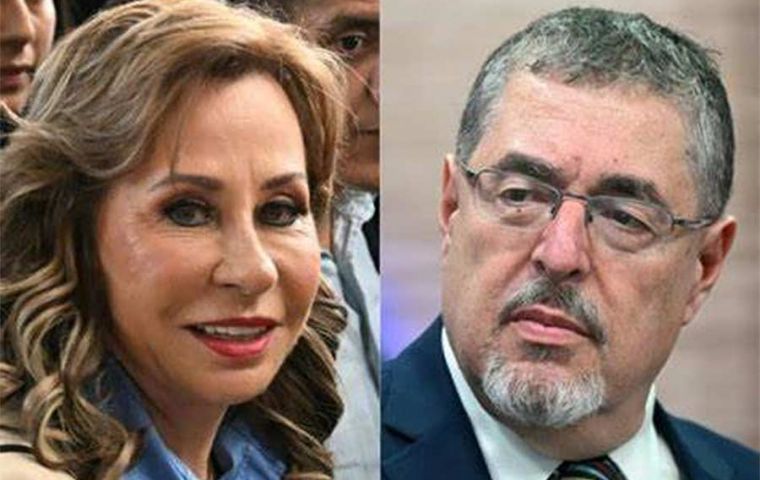MercoPress. South Atlantic News Agency
Guatemala highest court suspends election results and orders a new recount, EU, US, OAS complain
 In the general elections, Sandra Torres (15.86%) and Bernardo Arévalo (11.77%) were the most voted among 22 candidates; they will go to a runoff on August 20.
In the general elections, Sandra Torres (15.86%) and Bernardo Arévalo (11.77%) were the most voted among 22 candidates; they will go to a runoff on August 20. Following complaints of irregularities from right-wing parties, Guatemala’s highest judicial court ordered the suspension of election results on Sunday triggering doubts about the election process and generating concern from the EU, US, and OAS.
The Constitutional Court (CC) accepted a legal claim on Saturday and ordered the Supreme Electoral Tribunal (TSE) to suspend “the qualification and official results of the election, so that by the date scheduled for the second round, (August), of the presidential election, everything has been duly clarified,” according to a statement.
Prior to this provisional resolution, the court reported that nine right-wing parties filed the claim seeking to prevent the TSE from declaring the victory of certain candidates in the elections without first investigating alleged irregularities.
The CC is the highest court of justice in the country, above the Supreme Court of Justice; it oversees alleged violations of the Constitution, and its ruling is final.
In the general elections last Sunday, Sandra Torres (15.86%) and Bernardo Arévalo (11.77%) were the most voted among 22 candidates, and they will go to a runoff on August 20.
The CC’s ruling specifies that “a new hearing to review the vote count must be convened, in which legitimate parties may assert the objections and challenges they consider relevant.”
The resolution orders that, if it is proven that “the voting results could have been altered, the Departmental Electoral Board and/or the Central District Electoral Board must make the necessary modifications or, where appropriate, analyze whether the grounds for nullification provided by law are present.”
Allegations of fraud began one day after the elections when Arévalo León surprised everyone by advancing to the runoff, as the polls placed him in eighth place.
The parties, including the ruling party Vamos, filed a recourse against the TSE on Friday “considering that there is an imminent risk and threat” that positions will be assigned before the departmental electoral boards are aware of “the flaws contained in the national vote count records,” the court reported.
Also among them is the Valor party, which nominated Zury Ríos, daughter of the late dictator Efraín Ríos Montt (1982-1983), for the presidency. The party denounced a “fraud” in the elections on Friday, alleging the alteration of over a thousand vote count records.
The thousand records represent 0.82% of the 121,227 processed (out of a total of 122,293) in the vote count, according to official figures.
Ríos, who was among the top three favorites in the polls, ended up in sixth place with only 6.57% of the votes, while the official candidate Manuel Conde came in third (7.84%).
The ruling party Vamos, although not denouncing fraud, expressed its “concern over the evident discovery of inconsistencies between the presented records and the data computed in different polling stations.”
The European Union (EU), the US and the Organization of American States (OAS), after learning about the CC’s resolution, called for respect for the will of the people expressed at the ballot box.
The EU, in a statement, reiterated to “judicial institutions and political parties to respect the clear will of the citizens freely expressed in the June 25 elections.”
In a preliminary report on June 27, the EU stated that “citizens demonstrated their strong commitment to democracy and civic values” by going to vote but warned about “the deterioration of the rule of law and the politicization of purely electoral matters.”
The OAS expressed a similar sentiment, urging “the powers of the State, Legislative, Judicial, and Executive, to respect the separation of powers, the integrity of the electoral process, as well as the work and conclusions reached in this process.”
“The respect for the people’s expression through the vote is essential to maintain the fullest confidence in the elections by the citizens and the international community,” emphasized the regional entity in a press release.




Top Comments
Disclaimer & comment rulesCommenting for this story is now closed.
If you have a Facebook account, become a fan and comment on our Facebook Page!